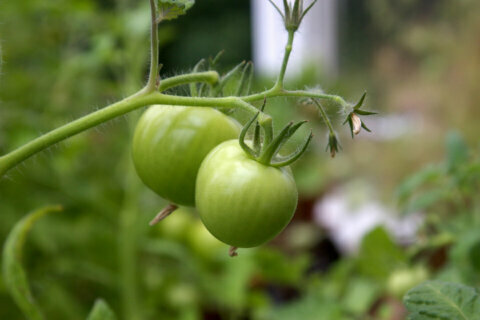Fight Mosquitoes with Plants!
The best plant-based alternative to the chemical mosquito repellent DEET is oil of lemon eucalyptus. This plant is among a handful of repellents—natural and chemical—recommended by the Centers for Disease Control and Prevention (an organization, by the way, that was originally created to control mosquito borne diseases in the United States, which is why its headquarters are down in the South).
Medical studies have consistently found products whose active ingredient is oil of lemon eucalyptus to be just as effective as roughly-equal concentrations of DEET. The basic starting point of these products is a real plant, specifically the leaves of a type of eucalyptus tree that’s native to Australia that, unfortunately, can’t grow here.
But you’ll find products whose active ingredient is oil of lemon eucalyptus everywhere mosquito repellents are sold.
Grow Your Own Mosquito Repellent
Many plants that do grow well in our region have been found to have very effective mosquito repellent properties, but not just growing in your garden or sitting nearby in a pot. In order for it to work, you have to crush up the aromatic leaves and rub them on your skin.
Studies have shown lemon thyme to be one of the best natural repellents, equal in effectiveness to some concentrations of DEET. Lemon thyme is a wonderful plant, with beautiful little leaves and a trailing habit that makes it perfect for growing in hanging baskets or over the edges of large containers.
The plant is also winter hardy. I’ve found that even in a big container, its roots survive most of our winters to grow again in the spring. Call it a half-hardy perennial (it would probably survive every winter planted in the ground, but I like to keep it in high-off-the-ground containers for easy pickings).
Its only disadvantage is that the leaves of lemon scented thyme, although lovely, are tiny. So, if you want to grow your own version of OFF!, start with a lot of plants.
You won’t regret it. It really is a great little plant.
Mosquitoes Don’t Like Lemon-Scented Herbs
If you want to avoid using the chemical repellent DEET, lemon-scented herbs are your best friend. The catch is that they don’t keep mosquitoes away just sitting there; they’re only effective if you crush up their aromatic leaves and rub them on your skin.
While lemon thyme has fared the best in scientific studies, the leaves of other lemon-scented herbs, like the equally pretty and well-behaved lemon verbena, are also effective.
The winner in my garden is lemon balm, which quickly grows the largest mass of leaves of any lemon-scented plant. Those leaves have proven themselves to be great mosquito repellents for me, my family and even friends who the mosquitoes go for first.
But the plant is not well-behaved. As a member of the mint family, it can quickly get out of control and become invasive if you plant it in the ground. So bring on the big pots!
Mosquito-Repelling Plants are Not a Myth
Remember those magazine ads for the famous “mosquito-repelling plant”? There would be a drawing of a couple sitting outdoors with one of the plants in a pot on the table in front of them and hordes of cartoon mosquitoes in obvious discontent at being denied their blood meal.
Well, those plants were (or maybe still are, but I haven’t seen the ads for a while) lemon-scented geraniums, and, like most lemon-scented plants, they do repel mosquitoes but only if you crush up the aromatic leaves and rub them on your skin.
WARNING: Don’t use real actual lemons for this. They can cause serious skin reactions! For examples of such a reaction, look up “cruise ship rash” if you don’t believe me.
Stick with the crushed up leaves of lemony herbs, of which lemon thyme has been shown to be the most effective. But it is hard to grow a lot of that small plant, which is why the McGrath family has big containers of lemon balm on our patio.
When we hear the first “buzz” of a hungry female checking us out, we prune off a bunch of branches, turn those branches upside down, strip off the leaves and rub them all over our exposed skin.
This keeps the skeeters away, and keeps you smelling lemony fresh!
Avon NOT Calling: Stick with Proven Plants
The mosquito-carried Zika virus has turned out to be all too real of a threat, proving its level of danger to be seemingly greater every day.
So in addition to cleaning out your gutters and removing other standing water on your property (do not neglect these basics), it’s probably more wise than ever to also use mosquito repellent outdoors.
If, like me, you want to avoid the chemical repellent DEET, the CDC also recommends products whose active ingredient is either oil of lemon eucalyptus or picaridin (a synthetic version of compounds found in black pepper plants).
But despite its “legendary” worth, Avon’s Skin So Soft failed all the bite-cage studies, so please don’t rely on passed-down rumors for mosquito protection.
Those “mosquito-repelling bracelets” have also been found to be ineffective. There was never any good reason to believe that these things would work as mosquito repellents must cover every part of your exposed skin.
And this is an important fact to remember: Stick to the CDC-approved list and be sure to cover every inch of exposed skin with your repellent of choice. Research on even the most effective repellents has shown that mosquitoes will still bite any areas that you miss.







